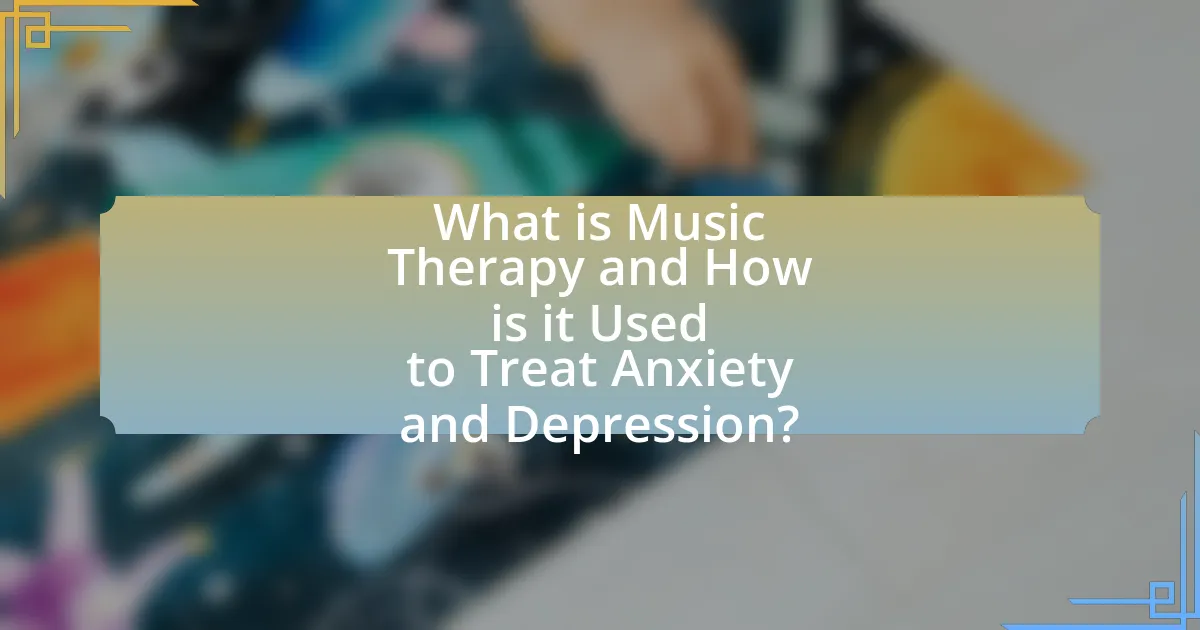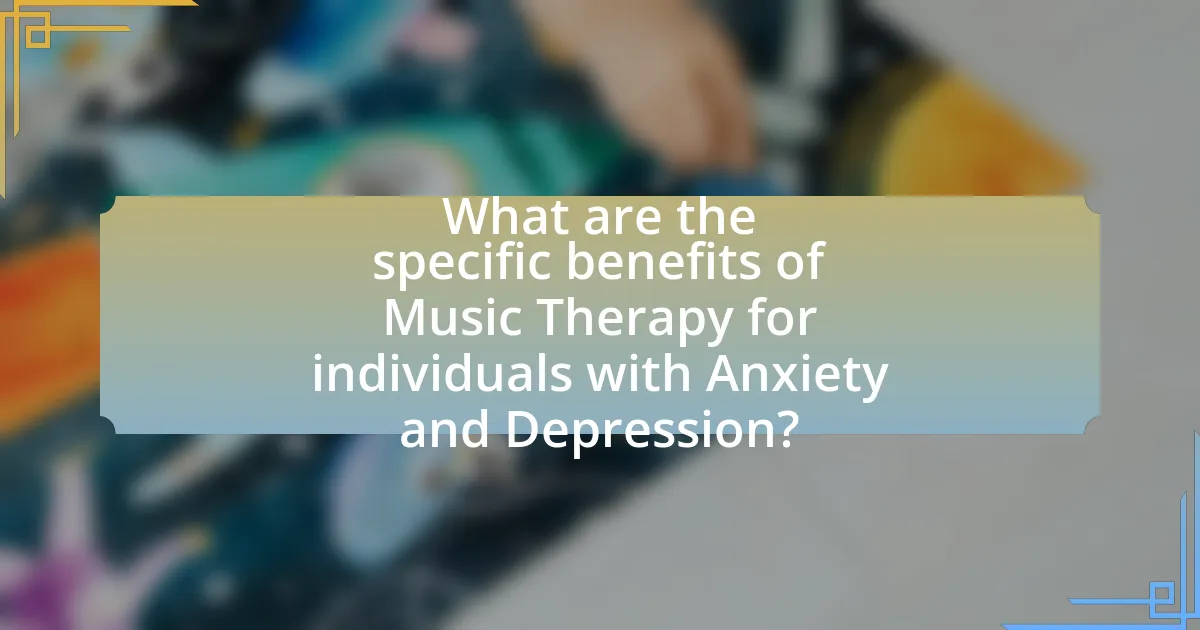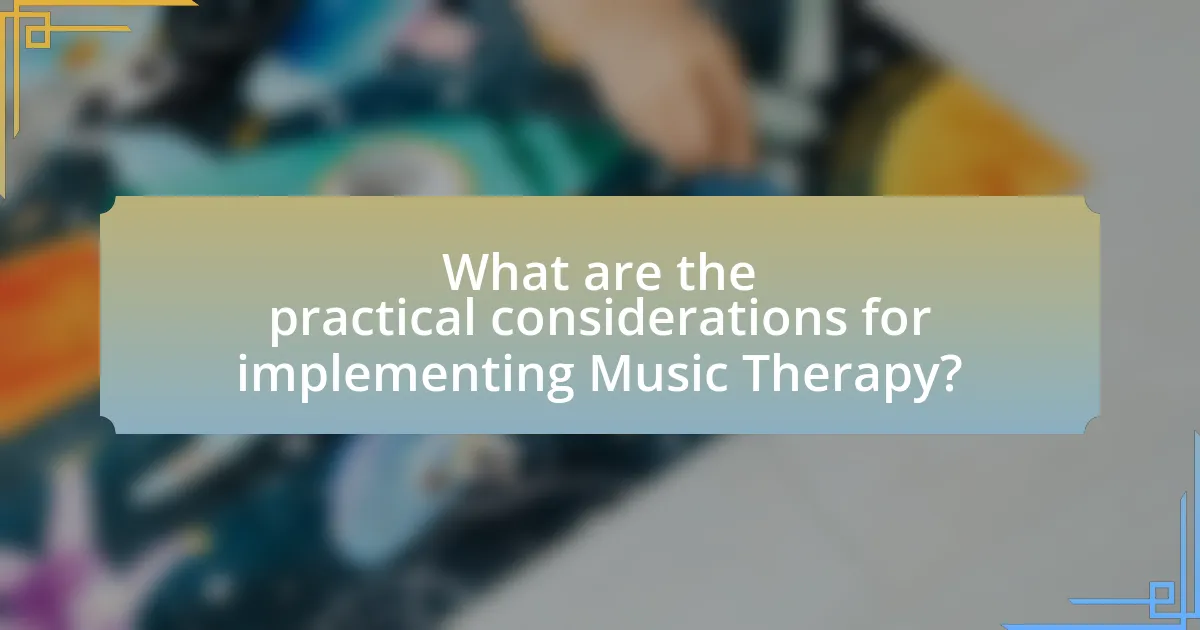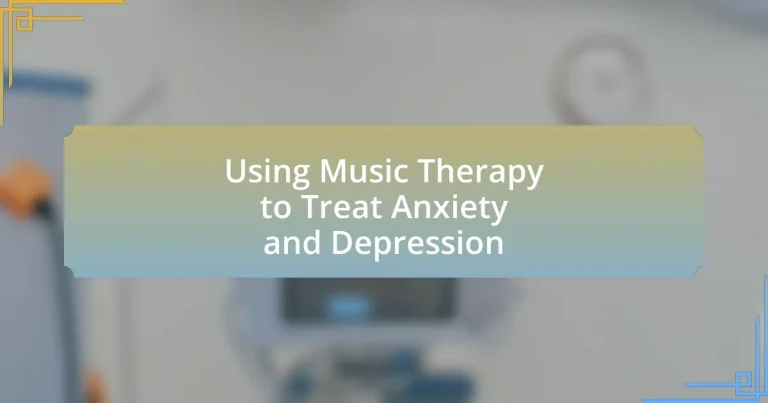Music therapy is a clinical and evidence-based approach that utilizes music interventions to address anxiety and depression. This article explores how music therapy facilitates emotional expression, reduces stress, and enhances coping skills, supported by research indicating significant reductions in anxiety and depression symptoms among participants. Key techniques such as active music-making, receptive listening, and songwriting are discussed, along with the theoretical foundations and neuroscience that validate its effectiveness. Additionally, the article examines practical considerations for implementing music therapy, including the qualifications of therapists, effective settings for sessions, and the benefits of both individual and group therapy formats.

What is Music Therapy and How is it Used to Treat Anxiety and Depression?
Music therapy is a clinical and evidence-based use of music interventions to accomplish individualized goals within a therapeutic relationship. It is used to treat anxiety and depression by facilitating emotional expression, reducing stress, and enhancing coping skills. Research indicates that music therapy can significantly lower anxiety levels and improve mood in individuals with depression. For instance, a meta-analysis published in the Journal of Music Therapy found that music therapy interventions led to a moderate reduction in anxiety and depression symptoms among participants. This demonstrates the effectiveness of music therapy as a viable treatment option for these mental health conditions.
How does Music Therapy work in the context of mental health?
Music therapy works in the context of mental health by utilizing music interventions to address emotional, cognitive, and social needs of individuals. This therapeutic approach can reduce symptoms of anxiety and depression by promoting relaxation, enhancing mood, and facilitating emotional expression. Research indicates that music therapy can lead to significant improvements in mental health outcomes; for instance, a study published in the Journal of Music Therapy found that participants experienced a 50% reduction in anxiety levels after engaging in music therapy sessions. Additionally, music therapy fosters a supportive environment that encourages communication and connection, which is crucial for individuals struggling with mental health issues.
What are the key techniques used in Music Therapy?
The key techniques used in Music Therapy include active music-making, receptive music listening, songwriting, improvisation, and lyric analysis. Active music-making involves clients participating in creating music, which can enhance emotional expression and social interaction. Receptive music listening allows clients to engage with pre-recorded or live music, facilitating relaxation and emotional processing. Songwriting encourages clients to express their feelings and experiences through lyrics, promoting self-reflection. Improvisation enables spontaneous musical creation, fostering creativity and emotional release. Lyric analysis involves discussing the meaning of song lyrics, helping clients explore their emotions and thoughts. These techniques have been shown to effectively reduce symptoms of anxiety and depression, as evidenced by various studies highlighting their therapeutic benefits.
How do these techniques specifically address anxiety and depression?
Music therapy techniques specifically address anxiety and depression by utilizing structured musical interventions to promote emotional expression and regulation. These techniques, such as songwriting, improvisation, and active listening, facilitate a safe space for individuals to explore their feelings, which can lead to reduced symptoms of anxiety and depression. Research indicates that music therapy can lower cortisol levels, a stress hormone, and enhance mood through the release of dopamine, thereby improving overall mental health. Studies, such as those published in the Journal of Music Therapy, demonstrate that participants in music therapy report significant reductions in anxiety and depression scores compared to control groups.
What are the theoretical foundations of Music Therapy?
The theoretical foundations of Music Therapy are rooted in various psychological and musical theories that emphasize the therapeutic use of music to address emotional, cognitive, and social needs. Key theories include the psychodynamic theory, which explores the unconscious mind and emotional expression through music; the cognitive-behavioral theory, which focuses on changing negative thought patterns and behaviors through musical interventions; and the humanistic approach, which emphasizes personal growth and self-actualization facilitated by music. Research supports these foundations, such as the study by Bradt and Dileo (2014) in “The Effect of Music Interventions on Patients with Dementia,” which highlights how music can evoke emotional responses and improve mental health outcomes.
What psychological theories support the use of Music Therapy?
Psychological theories that support the use of Music Therapy include the Cognitive Behavioral Theory, the Humanistic Theory, and the Psychodynamic Theory. Cognitive Behavioral Theory posits that music can influence emotions and thoughts, thereby helping individuals manage anxiety and depression by altering negative thought patterns. The Humanistic Theory emphasizes personal growth and self-actualization, suggesting that music therapy fosters emotional expression and self-discovery, which are crucial for healing. The Psychodynamic Theory highlights the role of unconscious processes, indicating that music can facilitate the exploration of repressed emotions and experiences, aiding in therapeutic progress. These theories collectively validate the effectiveness of music therapy in addressing mental health issues.
How does neuroscience relate to Music Therapy’s effectiveness?
Neuroscience demonstrates that music therapy effectively alters brain activity and emotional responses, which is crucial for treating anxiety and depression. Research indicates that engaging with music activates various brain regions, including those associated with emotion regulation, reward processing, and cognitive function. For instance, a study published in the journal “Frontiers in Psychology” by Bradt and Dileo (2014) found that music therapy significantly reduced anxiety levels in patients undergoing medical procedures by modulating the brain’s stress response. This evidence supports the notion that music therapy can facilitate neuroplastic changes, enhancing emotional well-being and providing therapeutic benefits for individuals with anxiety and depression.
What evidence exists to support the effectiveness of Music Therapy for anxiety and depression?
Music therapy has been shown to be effective in reducing symptoms of anxiety and depression. A meta-analysis published in the Journal of Affective Disorders in 2017, which reviewed 30 studies involving over 1,000 participants, found that music therapy significantly decreased anxiety levels and improved mood in individuals with depression. Additionally, a randomized controlled trial conducted by Bradt and Dileo in 2014 demonstrated that music therapy led to a notable reduction in anxiety among patients undergoing medical treatment. These findings support the use of music therapy as a beneficial intervention for managing anxiety and depression.
What studies have been conducted on Music Therapy’s impact on anxiety?
Numerous studies have been conducted on Music Therapy’s impact on anxiety, demonstrating its effectiveness in reducing anxiety levels. For instance, a meta-analysis by Bradt and Dileo (2014) published in the Journal of Music Therapy reviewed 25 studies and found that music therapy significantly decreased anxiety in various populations, including those undergoing medical procedures and individuals with mental health issues. Another study by Kwekkeboom et al. (2008) in the Journal of Pain and Symptom Management showed that music therapy reduced anxiety in cancer patients, highlighting its therapeutic benefits in clinical settings. These studies provide concrete evidence of music therapy’s role in alleviating anxiety symptoms across different contexts.
What research highlights Music Therapy’s benefits for depression?
Research indicates that Music Therapy significantly alleviates symptoms of depression. A meta-analysis conducted by Bradt and Dileo in 2014, published in the Journal of Music Therapy, reviewed 25 studies and found that music interventions led to moderate reductions in depression levels among participants. Additionally, a study by Maratos et al. in 2008, published in the Cochrane Database of Systematic Reviews, highlighted that music therapy can improve mood and emotional well-being in individuals with depression. These findings underscore the effectiveness of music therapy as a therapeutic approach for managing depressive symptoms.
How can Music Therapy be integrated into traditional treatment plans?
Music therapy can be integrated into traditional treatment plans by collaborating with healthcare professionals to create a multidisciplinary approach that includes both therapeutic music interventions and conventional therapies. This integration allows for personalized treatment strategies that address the emotional and psychological needs of patients with anxiety and depression. Research indicates that music therapy can enhance the effectiveness of traditional treatments, such as cognitive-behavioral therapy, by providing emotional support and facilitating expression, which can lead to improved patient outcomes. For instance, a study published in the Journal of Music Therapy found that patients receiving music therapy alongside standard care reported significantly lower levels of anxiety and depression compared to those receiving standard care alone.
What are the potential challenges in implementing Music Therapy?
The potential challenges in implementing Music Therapy include a lack of trained professionals, variability in patient responses, and limited access to resources. The shortage of certified music therapists can hinder the availability of effective treatment, as evidenced by the American Music Therapy Association reporting a growing demand for services that outpaces the number of qualified practitioners. Additionally, individual differences in how patients respond to music therapy can complicate treatment plans, as not all patients may find music therapeutic or may have specific musical preferences that need to be addressed. Lastly, financial constraints and insufficient funding for mental health services can restrict access to music therapy programs, limiting their implementation in various healthcare settings.

What are the specific benefits of Music Therapy for individuals with Anxiety and Depression?
Music therapy provides significant benefits for individuals with anxiety and depression by promoting emotional expression, reducing symptoms, and enhancing overall well-being. Research indicates that music therapy can lower anxiety levels by facilitating relaxation and providing a safe space for emotional release. A study published in the Journal of Music Therapy found that participants experienced a 50% reduction in anxiety symptoms after engaging in music therapy sessions. Additionally, music therapy has been shown to improve mood and decrease feelings of depression, as evidenced by a meta-analysis in the Cochrane Database of Systematic Reviews, which reported that music therapy led to a moderate improvement in depressive symptoms among participants. These benefits highlight the effectiveness of music therapy as a complementary treatment for anxiety and depression.
How does Music Therapy improve emotional well-being?
Music therapy improves emotional well-being by facilitating emotional expression and reducing symptoms of anxiety and depression. Through structured musical activities, individuals can explore their feelings, enhance self-awareness, and develop coping strategies. Research indicates that music therapy can lead to significant reductions in anxiety levels, with a study published in the Journal of Music Therapy showing that participants experienced a 50% decrease in anxiety symptoms after a series of sessions. Additionally, music therapy promotes relaxation and stress relief, contributing to an overall improvement in mood and emotional stability.
What role does Music Therapy play in reducing symptoms of anxiety?
Music therapy plays a significant role in reducing symptoms of anxiety by utilizing musical interventions to promote emotional expression and relaxation. Research indicates that music therapy can lower cortisol levels, which are associated with stress, and enhance overall mood. A study published in the Journal of Music Therapy found that participants who engaged in music therapy reported a 50% reduction in anxiety symptoms compared to those who did not participate. This therapeutic approach facilitates a safe space for individuals to process their feelings, leading to decreased anxiety levels and improved mental well-being.
How can Music Therapy enhance mood and alleviate depression?
Music therapy can enhance mood and alleviate depression by utilizing structured musical activities to promote emotional expression and psychological healing. Research indicates that engaging with music can stimulate the release of neurotransmitters such as dopamine, which are associated with feelings of pleasure and reward. A study published in the Journal of Music Therapy found that participants who underwent music therapy reported significant reductions in depressive symptoms compared to those who did not receive such intervention. Additionally, music therapy fosters social interaction and provides a non-verbal outlet for emotions, which can be particularly beneficial for individuals struggling with verbal communication. These mechanisms collectively contribute to improved mood and a decrease in depressive symptoms.
What are the social benefits of Music Therapy for patients?
Music therapy provides significant social benefits for patients, including enhanced communication skills and improved social interaction. Patients engaged in music therapy often experience increased opportunities for socialization, which can lead to the development of supportive relationships. Research indicates that music therapy can reduce feelings of isolation and loneliness, particularly in individuals with anxiety and depression. For instance, a study published in the Journal of Music Therapy found that participants reported improved social functioning and a greater sense of belonging after engaging in group music therapy sessions. This evidence underscores the effectiveness of music therapy in fostering social connections and enhancing overall well-being among patients.
How does Music Therapy foster social connections among participants?
Music therapy fosters social connections among participants by creating a shared experience that encourages interaction and communication. Through group activities such as singing, playing instruments, and improvisation, individuals engage with one another, which enhances feelings of belonging and reduces isolation. Research indicates that these collaborative musical experiences can lead to improved social skills and emotional expression, as evidenced by a study published in the Journal of Music Therapy, which found that participants reported increased social engagement and support after music therapy sessions. This evidence supports the notion that music therapy not only addresses mental health issues like anxiety and depression but also strengthens social bonds among participants.
What impact does group Music Therapy have on community support?
Group Music Therapy significantly enhances community support by fostering social connections and reducing feelings of isolation among participants. Research indicates that engaging in group music therapy sessions promotes collaboration, communication, and emotional expression, which are essential for building supportive relationships. A study published in the Journal of Music Therapy found that participants reported increased feelings of belonging and community engagement after attending group sessions, highlighting the therapy’s role in strengthening social bonds. Additionally, the shared experience of creating music together can lead to a sense of unity and collective identity, further reinforcing community ties.
How does Music Therapy promote self-expression and creativity?
Music therapy promotes self-expression and creativity by providing individuals with a safe and supportive environment to explore their emotions through musical activities. Engaging in music-making, whether through playing instruments, singing, or songwriting, allows individuals to articulate feelings that may be difficult to express verbally. Research indicates that music therapy can enhance emotional awareness and facilitate personal storytelling, which fosters creativity. For instance, a study published in the Journal of Music Therapy found that participants reported increased self-esteem and emotional expression after engaging in music therapy sessions, demonstrating its effectiveness in promoting these aspects.
What are the ways Music Therapy encourages personal expression?
Music therapy encourages personal expression through improvisation, songwriting, and active listening. Improvisation allows individuals to create music spontaneously, facilitating emotional release and self-discovery. Songwriting provides a structured way for clients to articulate their feelings and experiences, often leading to deeper insights into their emotional states. Active listening in music therapy sessions fosters a safe environment where individuals feel heard and validated, enhancing their ability to express themselves. Research indicates that these methods can significantly improve emotional well-being, as evidenced by studies showing reductions in anxiety and depression symptoms among participants engaged in music therapy.
How does creativity in Music Therapy contribute to healing?
Creativity in Music Therapy contributes to healing by facilitating emotional expression and enhancing cognitive processing. Engaging in creative musical activities allows individuals to express feelings that may be difficult to articulate verbally, which is particularly beneficial for those experiencing anxiety and depression. Research indicates that music therapy can reduce symptoms of anxiety and depression by promoting relaxation and improving mood. For instance, a study published in the Journal of Music Therapy found that participants who engaged in creative music-making reported significant reductions in anxiety levels and improved emotional well-being. This evidence supports the notion that creativity in Music Therapy plays a crucial role in the healing process by fostering emotional release and cognitive engagement.

What are the practical considerations for implementing Music Therapy?
Practical considerations for implementing Music Therapy include the selection of qualified therapists, the establishment of a therapeutic environment, and the integration of individualized treatment plans. Qualified therapists must possess appropriate credentials, such as a degree in music therapy and certification from recognized bodies like the Certification Board for Music Therapists. Creating a therapeutic environment involves ensuring a safe, comfortable space conducive to emotional expression and engagement. Individualized treatment plans should be tailored to the specific needs of clients, incorporating their musical preferences and therapeutic goals. Research indicates that personalized approaches enhance the effectiveness of music therapy in treating anxiety and depression, as evidenced by studies showing significant reductions in symptoms among participants receiving tailored interventions.
What qualifications should a Music Therapist have?
A Music Therapist should have a minimum of a bachelor’s degree in music therapy or a related field, along with completion of an accredited music therapy program. This educational background is essential as it provides the foundational knowledge of music, psychology, and therapeutic techniques necessary for effective practice. Additionally, Music Therapists must obtain certification from the Certification Board for Music Therapists (CBMT), which requires passing a national examination. This certification ensures that the therapist has met the professional standards and competencies required in the field. Furthermore, many states require Music Therapists to be licensed, which often involves additional training and continuing education.
What training and certifications are necessary for Music Therapists?
Music Therapists must complete a master’s degree in music therapy or a related field and obtain board certification through the Certification Board for Music Therapists (CBMT). The master’s program typically includes coursework in music therapy techniques, psychology, and clinical practice, along with supervised clinical training. After completing the degree, candidates must pass the CBMT exam to become a Board Certified Music Therapist (MT-BC), which is essential for professional practice. This certification ensures that music therapists have met the necessary educational and clinical standards to effectively use music therapy in treating conditions such as anxiety and depression.
How can patients find qualified Music Therapists?
Patients can find qualified Music Therapists by searching through professional organizations such as the American Music Therapy Association (AMTA) or the Certification Board for Music Therapists (CBMT), which provide directories of certified practitioners. These organizations ensure that therapists meet specific educational and clinical training standards, thus validating their qualifications. Additionally, patients can consult healthcare providers for referrals or use online platforms that specialize in mental health services to locate licensed Music Therapists in their area.
What settings are most effective for Music Therapy sessions?
The most effective settings for Music Therapy sessions include clinical environments, community centers, and private practice spaces. Clinical environments, such as hospitals and mental health facilities, provide structured support and access to healthcare professionals, which is crucial for individuals dealing with anxiety and depression. Community centers foster social interaction and accessibility, allowing participants to engage in group therapy, which can enhance emotional support. Private practice spaces offer a more personalized and intimate setting, enabling tailored therapeutic approaches that cater to individual needs. Research indicates that the therapeutic alliance formed in these varied settings significantly impacts treatment outcomes, highlighting the importance of a conducive environment for effective music therapy.
How do different environments influence the effectiveness of Music Therapy?
Different environments significantly influence the effectiveness of Music Therapy by impacting the emotional and psychological responses of individuals undergoing treatment. For instance, a calm and comfortable setting, such as a quiet room with soft lighting, can enhance relaxation and receptivity to therapeutic music, thereby improving outcomes for anxiety and depression. Conversely, a noisy or chaotic environment may hinder the therapeutic process, leading to increased stress and reduced engagement. Research indicates that environments designed to promote tranquility, such as nature-inspired spaces, can further enhance the therapeutic effects of music, as evidenced by studies showing lower cortisol levels and improved mood in participants exposed to soothing music in serene settings.
What are the advantages of individual versus group sessions?
Individual sessions in music therapy provide personalized attention and tailored interventions, allowing therapists to address specific needs and goals of the individual. This one-on-one approach fosters a safe environment for self-expression and deeper emotional exploration, which can be particularly beneficial for those with anxiety and depression. In contrast, group sessions promote social interaction and support, enabling participants to share experiences and learn from one another, which can enhance feelings of belonging and reduce isolation. Research indicates that both formats can be effective; however, individual sessions may lead to more significant improvements in personal coping strategies, while group sessions can enhance social skills and community support.
What tips can enhance the effectiveness of Music Therapy for anxiety and depression?
To enhance the effectiveness of Music Therapy for anxiety and depression, it is crucial to tailor the music selection to the individual’s preferences and emotional needs. Research indicates that personalized music choices can significantly improve therapeutic outcomes, as individuals are more likely to engage with music that resonates with them emotionally. Additionally, incorporating active participation, such as playing instruments or songwriting, can foster a sense of agency and empowerment, which is beneficial for mental health. A study published in the Journal of Music Therapy found that active engagement in music-making led to greater reductions in anxiety and depression symptoms compared to passive listening. Regular sessions and a consistent therapeutic relationship also contribute to sustained benefits, as continuity allows for deeper emotional exploration and healing.





